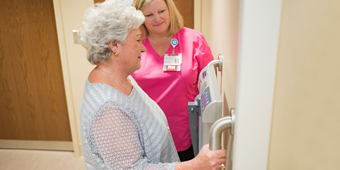Like Mother, Like Baby: Thyroid Health in Pregnancy

Answer a few questions and we'll provide you with a list of primary care providers that best fit your needs.
When you’re pregnant, your baby depends on your body to help her own brain and body develop. Sometimes, it’s easy to help your baby along, like making sure you eat healthy foods. In other cases, things happen that are beyond your control, and you’ll need the support of your doctor to keep you and your baby on a healthy course.
Thyroid problems, while rare, are one such example. When you’re pregnant, the hormones hCG (human chorionic gonadotropin) and estrogen raise the level of thyroid hormones in your body. This ensures that both you and your baby get an adequate supply.
But sometimes, the thyroid levels rise too high or fall too low. If this happens, it can be harmful for both of you. Read on to learn more about thyroid disease during pregnancy and what to do about it.
Why the Thyroid Matters
Here’s how too little or too much of the thyroid hormone affects pregnancy.
- Hyperthyroidism (a condition of overactive thyroids) can cause:
- Premature birth
- Preeclampsia, (pre-ee-CLAMP-see-uh) a dangerous condition that causes high blood pressure and problems with the kidneys and other organs
- Congestive heart failure
- Thyroid storm (a sudden, severe worsening of symptoms)
- Rapid heart rate in the newborn, which in turn can cause heart failure, poor weight gain, or an enlarged thyroid gland in the newborn that can make it hard to breathe
- Low birth weight
- Miscarriage
- Hypothyroidism (a condition of underactive thyroids) can cause:
- Anemia (lower than normal number of healthy red blood cells)
- Preeclampsia
- Low birth weight
- Miscarriage
- Stillbirth
What Causes Thyroid Problems in Pregnancy?
The most common cause of hyperthyroidism in pregnant women is Graves’ disease. This is an autoimmune disorder in which the immune system attacks the thyroid gland, causing it to produce more thyroid hormone than the body needs.
If you’ve been treated for Graves’ disease with radioactive iodine ablation, your thyroid is now considered to be underactive. The thyroid medication you take, such as levothyroxine, does not cross the placenta and is safe during pregnancy. If you are on thyroid hormone replacement during pregnancy, it’s likely that your dose will require adjustment. Your doctor will check your levels several times during the pregnancy. After the delivery, the dose often needs to be reduced.
Hypothyroidism in pregnancy can also be the result of another autoimmune disorder, known as Hashimoto’s disease. In this case, the immune system also attacks the thyroid gland, causing inflammation and interfering with its ability to produce thyroid hormones. The gland then produces less hormone than the body needs.
Rest assured: if you have or develop thyroid problems while pregnant, you can still have a healthy pregnancy and protect your baby’s health.
Diagnosing Thyroid Problems
Your doctor probably won’t routinely test for thyroid disorder unless you have a history of thyroid or endocrine problems, or one of you suspects a problem. If this is the case, he will conduct a physical exam and order blood tests to measure your thyroid hormone levels.
If you are experiencing any of the symptoms below, tell your doctor. Keep in mind that some (like fatigue) are similar to the side effects of pregnancy, making thyroid problems tricky to pinpoint.
- Hyperthyroid symptoms:
- Increased heart rate
- Heat intolerance
- Fatigue
- Rapid and irregular heartbeat
- A slight tremor
- Unexplained weight loss or failure to have normal pregnancy weight gain
- Severe nausea and vomiting
- Hypothyroid symptoms:
- Fatigue
- Sensitivity to cold
- Hoarseness
- Swelling of the face
- Weight gain
- Constipation
- Dry skin and hair
- Carpal tunnel syndrome (hand tingling or pain)
- Slow heart rate
- Muscle cramps
- Trouble concentrating
 Treatment During Pregnancy
Treatment During Pregnancy
Mild hyperthyroidism in pregnancy does not require treatment. More severe cases are treated with anti-thyroid medications, which prevent the thyroid from producing too much hormone. Your doctor will order the lowest effective dose, in order to avoid hypothyroidism in the baby.
Rarely, some women may need surgery to remove part of the thyroid. This is usually performed in the second trimester.
Radioactive iodine, sometimes used to treat hyperthyroidism, is not recommended in pregnancy because it can destroy the baby’s thyroid gland.
The good news is that hyperthyroidism due to Graves’ disease often improves in the latter stages of pregnancy, so treatment is sometimes suspended. However, after delivery, it can worsen for the first few months.
If you’re diagnosed with hypothyroidism, you’ll be treated with thyroid hormone replacement.
Experts also recommend pregnant women maintain a balanced diet and take a prenatal multivitamin and mineral supplement containing iodine to receive most nutrients necessary for thyroid health. However, talk to your doctor before using any supplements during pregnancy.
Rest assured: if you have or develop thyroid problems while pregnant, you can still have a healthy pregnancy and protect your baby’s health. Just make sure you learn about the effects of thyroid problems on pregnancy, keep up-to-date on testing, and take all medications as directed.
Answer a few questions and we'll provide you with a list of primary care providers that best fit your needs.
Source: National Institutes of Health; Womenshealth.gov; Hormone Health Network




